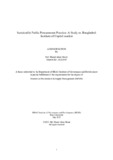Sustainable public procurement practice: a study on Bangladesh Institute of Capital Market

View/
Date
2023-07Publisher
Brac UniversityAuthor
Monir, Md. Murad AlamMetadata
Show full item recordAbstract
The term "sustainable procurement" (SP) refers to purchasing that adheres to the ideals of sustainable development, including fostering good governance, maintaining a strong, healthy, and just society, and preserving the environment. Sustainability in purchasing Reduces waste, makes the best use of natural resources, takes into account carbon emissions, energy use, and water use, safeguards biodiversity, cultivates suppliers, maintains sustainable economic growth, and helps the community and society. Sustainable procurement is an approach that takes economic, environmental and social sustainability into account when making any purchasing decisions.
Public procurement refers to how public sector organizations use funds provided by taxpaying citizens to purchase products, services, and labor. Transparency, accountability, and obtaining value for money for residents and tax payers serve as the cornerstones of public procurement.
Reviewing the literature demonstrates the paucity of research on BICM and sustainable procurement in the public sector. This work seeks to contribute to a growing body of research on BICM's drivers and obstacles, as well as the degree to which they support sustainable procurement practices. The study seeks to shed light on both drivers and critical barriers affecting the implementation of sustainable procurement at BICM. The technical criteria related to sustainable procurement should be included in the tendering system. Organization's top management commitment and instruction is necessary for sustainable procurement. Finally, there is a huge scope to further study about the sustainability issue. Advanced research needs to be conducted in order to get a deeper insight into the sustainability issue in relation to BICM's procurement as well as other national Institutions.
